
Egelric could not help but slide his hands back beneath the table after every bite. By the brighter light of candles they seemed unforgivably brutish: broad and heavy, with their thick, bark-like skin and their knobby knuckles like whorled cankers on a tree.
Nor did he know how to eat with them except brutishly, whether he tore his bread between his fingers or hacked it into pieces with his knife, and the very act of stuffing it into his mouth felt coarse and vulgar. Eating suddenly seemed an activity that a man should undertake in private, and certainly not in the presence of a Princess.
The Princess, meanwhile, was struggling with her own bread. The slice she had cut was too fine, and in her attempts to butter it her knife kept tearing through. Egelric would have offered to help if only bread-buttering had not required hands.
Finally she dropped the tattered slice and laid down her knife. “I do not know how buttering bread yet,” she laughed awkwardly. “Andronikos knows…”

Egelric snuck his hands out as discreetly as such big hands could sneak and picked up the loaf and knife. He was already self-consciously aware that Andronikos had been sent away on his own account, but he had not realized to what extent the Princess depended on him.
“You have to cut it thick if the butter’s cold,” he explained as he sliced. “And you don’t want to take a big knob of butter. The trick is to scrape off thin slips with your knife – ”

He carelessly held out a curling flake of butter on the side of his blade, but his arm locked stiff with horror as her face swooped down to meet it. It stopped only inches away, and she squinted in earnest inspection, as though the broad blade of his knife were merely a silver platter – as though the brutish fist that held it were not massive enough to bruise the entire side of her face with one blow.
He carefully lowered the knife away from her face and slapped the butter down on the bread.
“ – and then you don’t have to spread at all,” he said shakily, “just tamp them down.”
He could hide the tremor in his voice simply by refusing to speak, but he could not help his hand; he could only seem to steady it by bearing down on the butter and bearing down on the bread.
Irene watched intently, so carefully following his gestures that her fingers closed around the handle of her own knife in mute imitation.

Her little pearl-handled, stub-bladed butter knife! Egelric bit back a wild laugh: could she truly not see the difference between hers and his?
He had killed with this knife. He had finished off pretty little roe deer with this knife – crushed their shoulders into the earth with his knee, and squeezed their delicate muzzles in the bruising grip of his left hand to bare their throats to the knife in his right. Their hot blood had spurted out across this blade and all over the back of his brutish hand, and now this hand and this knife were buttering this pretty, delicate little woman’s bread.
He must have been staring dumbly at the slice even after it was done, for he was suddenly aware of her thin fingers flickering in at the edge of his vision and stealing it away.

“Ach! Let me do another…” he begged. He held out his hand pleadingly to take it back. “I did a poor job with that one… my knife’s too big…”
Irene shook her head and took three tiny, hasty bites off the edge of it, like a rabbit nibbling at a leaf. The corners of her mouth smiled at him as she chewed.
In despair Egelric put down his knife and picked up his spoon.
“It is better than Andronikos he does,” she said. “We do not eat butter in our country.”

Egelric grunted. “What do you eat on your bread? Cheese?” He took a bite of porridge and abandoned his spoon in his bowl in order to slip his hands beneath the table again.
Irene lifted the slice of bread to the level of her eyes and studied the relief of the butter from the side. She said simply, “Oil.”
Egelric swallowed hurriedly and gasped, “Oil? You mean oil? On your bread? For breakfast?”

“Oil of olives.” She smiled at his dismay. “You do eat fat of goose on your bread for breakfast.”
“Aye, but – but that’s good!” he protested.
Her smile broke into startlingly rich laughter, almost unhealthily luxurious, like her hair.
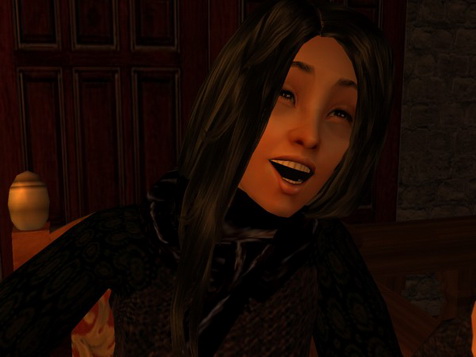
The dark embers of his anger began to flicker. He had not gone forth intending to make ladies laugh, and neither would he tolerate their laughing in spite of him.
“You would have liked the old cook at Nothelm,” he said low, coldly indifferent to her ability to understand his English. “Her culinary perversions may well have extended to dumping oil on bread and calling it breakfast.”
Irene discreetly stirred her spoon through her porridge until she had reassembled enough of his words to formulate a vaguely pertinent reply.
“I never take a breakfast at Nothelm. What are they eating there?”
“This sort of thing, these days,” he mumbled. He extracted his hand long enough to wave it vaguely at the food on the table. “A proper English breakfast.” He could not help adding slyly, “With goose fat. On bread.”
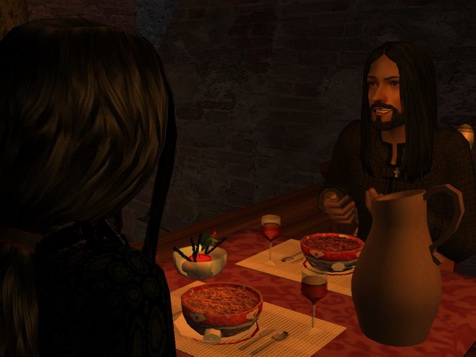
Irene managed to smile and wrinkle her nose at the same time, which made her appear briefly more rabbit-like than ever, except for her weary eyes.
“Alred and Hetty will never forgive me for telling you that,” he muttered. “Now you’ll never go.”
“They are having butter too?” she asked hopefully.
“Aye, but every man, woman, and child must eat his scoop of goose fat,” he said gravely. “It’s the law.”
Irene tipped back her head beneath her heavy hair and giggled merrily at the roof.

Egelric’s hands clenched beneath the table in anger. Somehow, without trying to, he had tried to make this woman laugh.
“That’s why I’m here,” he growled at his bowl. “Alred wanted to invite you for Christmas, but for some reason he sent the very worst man for the job. Not only did I warn you about the goose fat, but by God, I hate Christmas.”
Egelric attempted to stab his spoon into his porridge, but he saw at once that a spoon made a ridiculous weapon and porridge a stodgy, unsatisfying victim.
Irene hesitated for a moment, but at last she must have decided the meaning of the word was too critical to be guessed. “What is… hate?” she asked.
Egelric put down his spoon and smiled grimly. This woman did not know what “hate” was. He would be the man to teach her “hate.” The idea pleased him.
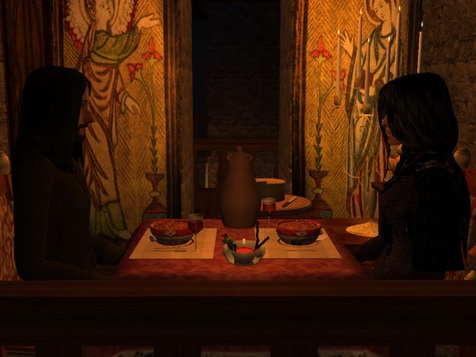
“Hate…” he mused. “Do you know what it is to love? To like very, very much?”
She nodded eagerly.
“Hate is the opposite of love. Hate is to not love. Very, very much.”
It was an absurd, childish, unsatisfying explanation, and he dipped his head and scowled into his beard. How could he express hatred to her? How could he express that desire to smash and shred and slay – that seething, subterranean fury – that undying passion that could animate a man to the end of his days, though everything else he lived for passed away?
While he wondered, Irene said thoughtfully, “I hate the winter time. Is that right?”

Egelric glanced down into the hall below, where the morning fire seemed only a tiny speck of cold light: merely a marker lit to indicate the spot where the fire should be.
“Tell me,” he asked earnestly, “are you cold here? I mean to have a talk with these people before I go,” he added, though it seemed the idea only occurred to him as he spoke it. “Britmar would be furious if he knew how they were treating a lady in his name.”
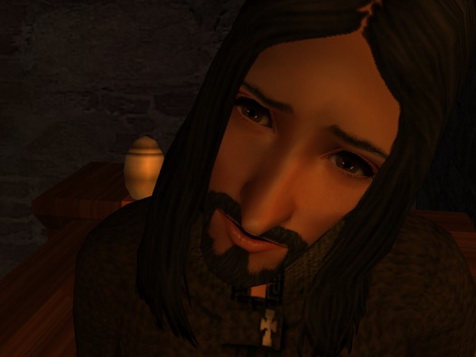
She shook her head firmly, but her arms folded themselves across her body out of the habit of cold.
“I hate the winter time not because the cold,” she said. “I hate the dark sky all of the time.”
Her careful “all of the time” rattled like a tumbling pail, but her “hate” was tense and lush. She had understood the great depths of the word at once, but it seemed she had filled them with the wrong meaning. It was not the “hate” he knew – not anger, but anguish.

“How can I being happy,” she whimpered, “if always the sky it is sad? I miss the sun.”
Someone had already taught her “miss”. Someone had come before him and taught her how to express love and longing. It had taken Egelric to try to teach her “hate”. He folded his hands together beneath the table and wrinkled his brows in shame.
“It’s the dark time of the year,” he said slowly, picking his way carefully through his own shadows in search of simple words she might assemble into a patchwork of comfort. “That is why we make our houses bright. That’s why we have the yule log, and the holly with its bright berries. That’s probably why we have Christmas, too,” he sighed. “You might go to Nothelm after all, my lady. You’ll never notice the sky isn’t bright.”
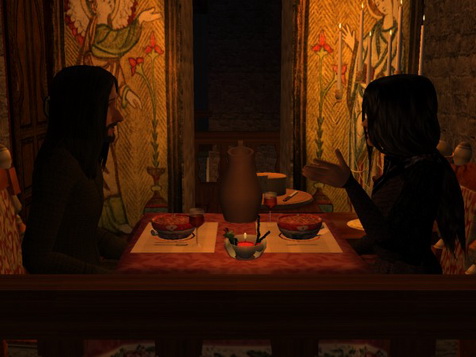
She smiled weakly. “But the goose fat?”
“I shall eat your goose fat and you shall eat my butter,” he winked, though he had not had a breakfast at Nothelm in weeks and had no intention of having one. “It won’t be the first time I’ve broken the law before noon.”
She picked up her nibbled slice of bread and smiled softly to herself before taking a bite.
“And by Twelfth Night,” he said, “the days are already getting longer again. Every day is a little brighter than the last, and it isn’t so… difficult to keep on…”

He trailed off and bit his lips together to distract himself with this simple pain. In his groping after words he had stumbled into the familiar language of grief, into the well-worn traces of words that he had said through all his life’s recurring seasons of loss, or that had been said to him.
“You hate the winter time too?” she asked.
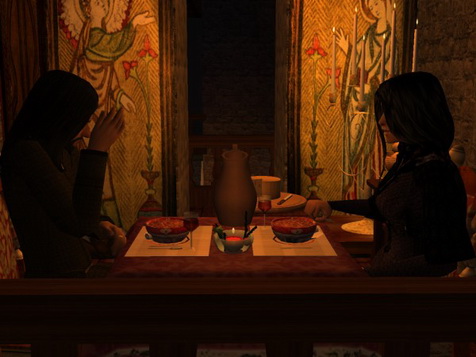
He laid his head in his brutish hand for a moment. He reminded himself she was only speaking of the season of the year. He was a farmer, from the calluses of his brutish hand to the great depths of his heart, and he loved them all.
He lifted his head.
“No, I do not. One cannot love a spring as one ought, my lady, unless one has suffered through the winter. Without winter, flowers are a commonplace thing, like weeds. Without winter, the lambs come at any time at all, and there’s not the joy of seeing them all together. Without winter… by God, there are no strawberries.” He leaned across the table and asked gravely, “Have you ever tasted a strawberry?”

Irene shivered and smiled. “No!” she whispered.
Egelric sat back and smacked his heavy hand down on the table. “The devil! You’ll be thanking God He made winter once you realize He made strawberries as its reward!”
Irene wrinkled her nose impishly. “Berries of straw?”
Egelric laughed. “Ach! I don’t know where the straw comes in. They’re wee red berries that grow along the ground in the forest – no straw involved, you have my word.”
“Red berries?” she asked. Her face was starkly serious and her high forehead lightly furrowed, as though she concentrated all her mind on learning these details.

“Little red berries,” he repeated, holding up his finger and thumb to show the size, forgetting their brutishness for a moment. “Pointed on one end like a heart. Red with tiny black seeds – on the outside,” he said firmly. “There’s nothing like it. Alred has a book with pictures, if you come.”
She nodded eagerly.
“The devil!” he sighed. “Once you have your first bowl of strawberries and cream for breakfast! Better than any candy – ”
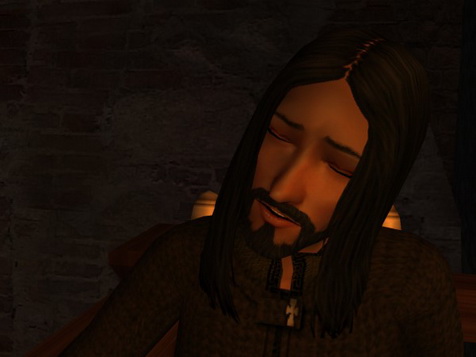
His mouth stuck fast around the word. It was Lili who had always said so; Egelric had never been a man accustomed to comparing anything to candy.
To him, better than eating strawberries and cream was sliding his bowl across to Lili after she had polished off her own, and watching her moaning with delirious pleasure as she devoured them, until she was reduced to scraping the bowl with her spoon and then her finger, seeking the last of the pink-colored cream.

Spring would come, and strawberries would come, and the cows would calve and make the finest, richest cream of the year – and there was no more Lili to enjoy them. The idea was inconceivable – even immoral – and yet he was a farmer down into his bones, and he knew it would be so.
“I don’t know what I’m saying,” he muttered. “Listen to me blethering on. I haven’t talked so much in weeks, and you don’t understand a third of it.”
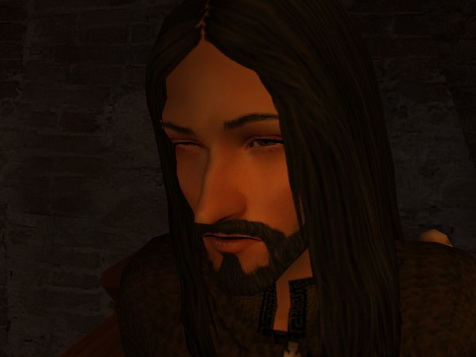
“I understand,” she protested softly.
“No, you don’t,” he snapped, annoyed at her presumption.
Her shoulders sagged beneath her shawl, and she cocked her head, as though she had grown too weary to counterbalance the weight of the fuller half of her hair. Out of her mournful eye she presumed to stare at him.
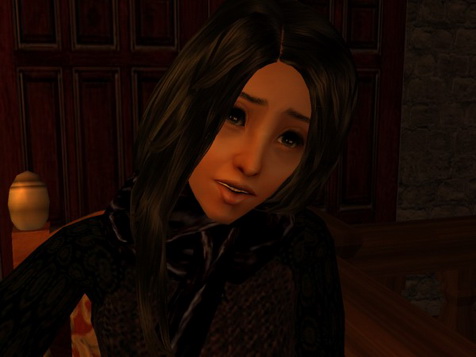
“You don’t understand anything at all,” he growled.
She did not move her head, but her eyes looked down at her plate, and then he saw only their thick lashes and their heavy, waxen lids: like her hair, unbearably lush. It was wondrous to think she could open them every morning, and lift them and bat them all through the day.
“About me, I mean,” he added roughly.
“I understand,” she repeated.
He recalled then that she had lost her husband not so very long ago. Like Lili she had lost her first-born son.
“No, about me,” he said. “You don’t understand anything about me. You don’t know anything about me – what sort of man I am.”

She folded her arms across her breast again, but he knew the gesture was meant only to warm herself. If she had wanted to protect herself, she would not have leaned forward – she would not have lifted her head within reach of his fist and bared her throat to the knife that lay beside his plate.
“A bad man!” he insisted. His voice was growing shrill with frustration at her unwillingness to submit and agree. All he wanted was to be misunderstood. “Do you hear?”
“No,” she pouted, as blind to this danger to herself as she was blind to the difference between his knife and hers.
“Aye! What do you know about it? You don’t know what men can be!”
Her head snapped up in spite of the weight of her hair. “I know,” she snarled through her teeth.
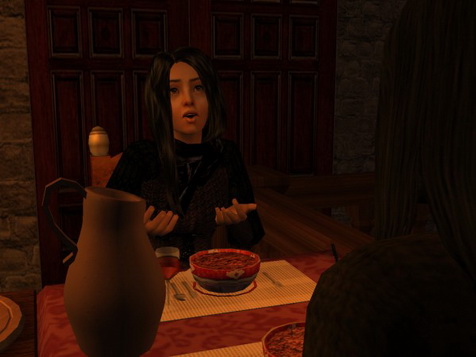
Egelric faltered in his fury. What did he know about her? All he knew of her story was that it was apparently too painful to tell.
Then he had a thought that proved she could not understand as well as she claimed.
“No, you do not!” he growled. “You don’t even know what an evil man is!”
“I know!” she cried. “I know!”
“No!”
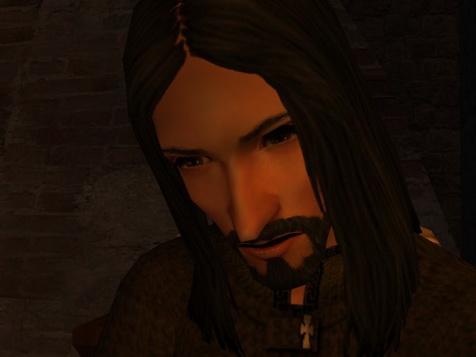
In one sudden swoop Egelric’s hand raised the knife and stabbed it straight down through the loaf and into the board beneath. The knife made a vicious weapon. The hard-crusted loaf with its soft core made a satisfying victim.
“You don’t know!” he snarled. “Or you’d be more careful in what sort of man you invite up–stairs to breakfast!”
Her body stiffened, and she rocked it slowly back into her chair, away from his fist and away from the knife it still held. Her cheeks and lips had gone so white that the hollows of her face appeared purple, as though she had been given two black eyes.
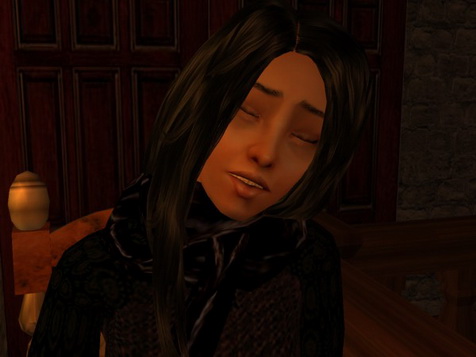
Egelric had just enough presence of mind to jerk the knife free of the wood and slip it into his boot before his head crashed into the nest of his brutish hands. His shoulders shook, but his limbs were tingling and going slack. It was a dizzying, plummeting descent from giddy heights, as like and unlike the ecstatic release of love-making as hatred was like and unlike love. Worst of all was when they seemed the same.
“I’m sorry,” he said hoarsely. “I don’t know why I did that.”
“I don’t know why, too,” she whimpered.
“I don’t – usually eat breakfast,” he choked, for he had nothing better to say. The rising tide of his nausea proved it had been a bad idea.
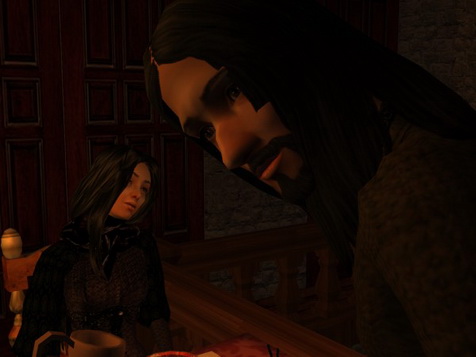
He kicked back his chair and stumbled up and nearly into Andronikos. Egelric had not heard him come in. He did not know how long he had been watching, or what he had seen or heard.
Andronikos did not move so much as his head, but his glittering eyes followed Egelric unblinking as he staggered away.







Wow,what has this princess gone through? Could she be referring to Andronikos' abuse. (even though we don't really have any proof he's bad except the thing in the hallway with Kaaria) Or something in her past, like the death of her husband? Does she understand more english than she's letting on? But she asked what "hate" meant, so I guess it can't be that much. So many questions that only open up to ten more!
When I first read the title, I was like "NO! Bad Egelric! Don't hurt her!" and my heart nearly stopped when he pulled out his knife, what three posts, and I already love Irene!
EDIT: And what is up with the banner? It looks like the Block is going to jump Margret! Or maybe corned her to yell about the smothering she gave him. Heh. *starts clicking the crap out of the refresh button*